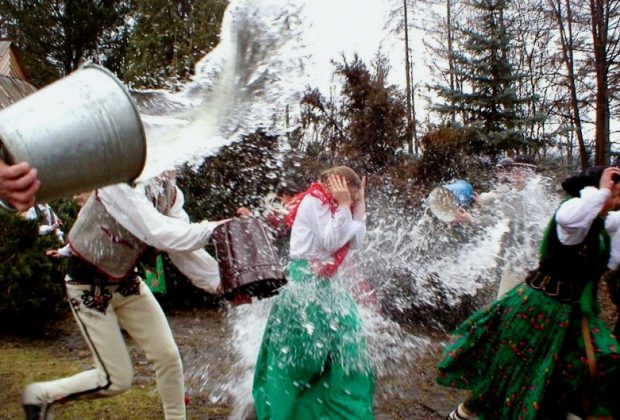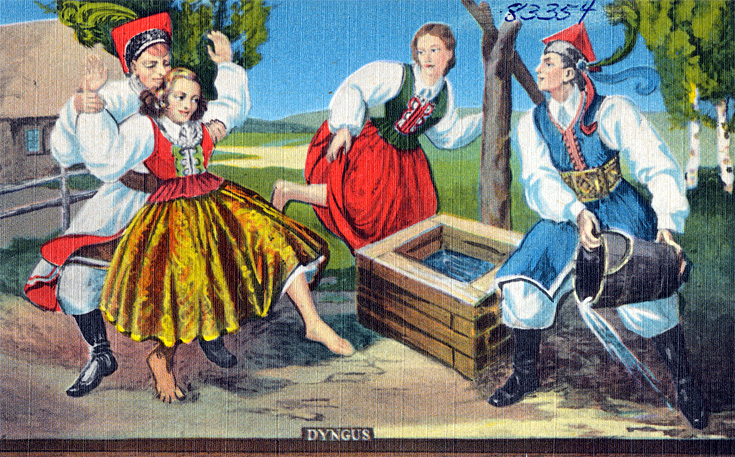Words Appraisal
Life’s mystery deepens as time proceeds.
He’s less sure now of everything.
And doubt turns out to have its thrills.
Nearby Muzak — or whatever — plays a vintage tune
Conjuring parties long past, elsewhere some tabloid
Headlines a famous beauty’s imminent demise.
Life’s mystery deepens as time proceeds.
The past catches up as the future recedes,
While deflowered winter courts the barren heart.
Raffael’s fish loaves
Words, words, words New Criterions. : “Will we lose Shakespeare?”
Examining Shakespeare’s Words
WSJ Op-Ed: Why Churches Are Packed On Easter Sunday
Lush the Content Agency via Filament: “…Writers typically don’t use more than two or three adjectives at a time, and we don’t seem to struggle much in getting their order correct. But occasionally there can be some confusion. This is where the royal order comes in. But, what’s an adjective? Let’s back up and start with the basics. An adjective is a word that describes (editors say modifies) a noun. There are two kinds of adjectives: attributive and predicative. An adjective is attributive when it stands in front of a noun and describes it – for example, the white dog ran across the road. An adjective is predicative when a verb separates it from the noun or pronoun it describes – for example, the teacher was furious.
- The royal order – Adjectives fall into categories. The royal order of adjectives dictates that those categories absolutely have to be in this order: Determiner, Observation or opinion (original, appealing, cheap), Size (small, thin, large), Age (young, old, new) Shape (rectangular, square, round), Color (red, yellow, green), Origin (Australian, American, Norwegian), Material (describing what something is made of: silk, copper, wooden), Qualifier (final adjective, often an integral part of the noun: vacation resort, wedding dress, race car)…”
CATS DO TOO, THEY JUST DON’T CARE: Brain scans reveal dogs know which words stand for certain objects.
THESE ARE THE DAYS OF MIRACLE AND WONDER: Your Favorite Trashy Cocktail Is Now Incredibly Highbrow. “How bartenders are turning the Appletini, Jello Shot, Pickleback and Long Island Iced Tea into more elevated affairs.”
A WHIFF OF TENSION: Dogs can detect trauma stress by smelling humans’ breath, study shows
ERIC SWALWELL MOST AT RISK: Next epidemic to spill out of China could be SUPER GONORRHEA – where rate of antibiotic-resistant STIs are 40x higher than US and UK. “These findings underscore the urgent need for a comprehensive approach to address antibiotic-resistant N. gonorrhoeae in China, including identifying factors contributing to this high resistance rate.”
UNEXPECTEDLY! Australian soccer team with 5 transgender players goes undefeated in women’s tournament: ‘Huge difference in ability’.
Meanwhile in Poland on Easter Monday

Today is Śmigus-dyngus, meaning “Wet Monday”, a holiday celebrated mostly in Poland. Traditionally boys would pour water on girl they fancy and and spank them with pussy willow branches on Easter Monday, and girls give them an egg, money, brandy or gifts in return! Folks nowadays can still get carried away with all-day water battles, but most just sprinkle family members with water and exchange gifts. The origins of the celebration are uncertain, but it may date to pagan times before 1000 AD; it is described in writing as early as the 15th century.

After all the water had been thrown, the screaming girls would often be dragged to a nearby river or pond for another drenching. Sometimes a girl would be carried out, still in her bed, before both bed and girl were thrown into the water together. Particularly attractive girls could expect to be soaked repeatedly during the day… Girls could save themselves from a soaking by giving boys “ransoms” of painted eggs (pisanki), regarded as magical charms that would bring good harvests, successful relationships and healthy childbirths. Although in theory the girls are supposed to wait until the following day to get their revenge by soaking the boys, in practice both sexes throw water over each other on the same day.
It continues to be observed throughout Central Europe, and also in the United States, where certain patriotic American elements have been added to the traditional Polish ones. It’s mostly a case of light sprinkling of water
Found on Wikipedia.



